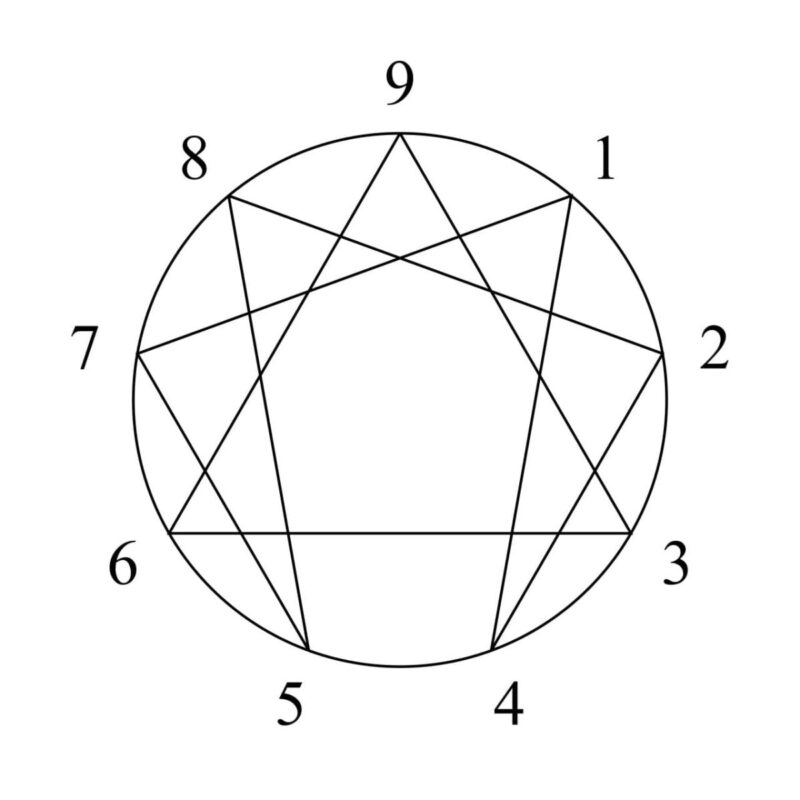“Newlywed Diary” posts are going to be Andrew’s personal reflections on married life, descriptions of what it’s like to be a newlywed, and anything else random he may be thinking and learning about at the moment.
This diary entry’s focus is all about the Enneagram and how it has helped me better understand myself in the context of marriage—give me a shout out if you are a fellow type 9! If you are curious about finding out your Enneagram type, you can take the free test here.
The Enneagram: A Christian Perspective?
So what IS the Enneagram? The Enneagram is a personality test that models different aspects of human personality into 9 different “types.” You may have heard of people refer to the types by these common names and traits:
- The Perfectionist: rational, idealistic, principled
- The Helper: caring, generous, people-pleasing
- The Achiever: adaptive, pragmatic, driven
- The Individualist: sensitive, withdrawn, expressive
- The Investigator: perceptive, innovative, cerebral
- The Loyalist: committed, engaging, responsible
- The Enthusiast: spontaneous, versatile, fun-loving
- The Challenger: self-confident, decisive, confrontational
- The Peacemaker: easygoing, receptive, agreeable

The Enneagram dates way back in history to the teachings of early Christian and Sufi mystics, but was only recently popularized in 1915 by Armenian philosopher George Gurdjieff. I remember seeing this book by Richard Rohr on my church’s bookshelf entitled “The Enneagram: A Christian Perspective.”
Full disclosure: I haven’t read it. But, the book title made me pause. Why the need to specifically call out a Christian perspective on a personality test?
I guess my own personal take is that like the Myers Briggs personality test, or any other personality test, a test is still just a test. The Enneagram test and Myers Briggs test are helpful tools, not surefire descriptions. I find them to be fun conversation starters.
Without reading Rohr’s book, I would assume the “Christian perspective” of the Enneagram is to embrace the assumption that the 9 personality types all embody different aspects to the image of God. And since humans were made in the image of God, it follows that everyone has the capacity to demonstrate traits from each of the 9 types, even if they strongly resonate with one type. I don’t know if I believe all the arrows, the wings, and the “perfect symmetry” of it all yet (it sorta reminds me of the Chinese zodiac, especially when it comes to “compatibility” and what Enneagram type is compatible with which), but I resonate with the concept of understanding the motivations and fears behind each personality type.
The Enneagram is also fairly common within the Christian world. I don’t remember the exact quote, but many resources talk about “knowing yourself so that you may know God.” And to know God means to know how to traverse and interact with his world—in particular, dealing with people and relationships!

Using the Enneagram in Marriage
So how does the Enneagram tie in to being newlywed? Well, I’ve had my fair share “knowing myself in order to know God.” I have to understand myself before I’m able to be more understanding and loving in my marriage! I’m an Enneagram type 9, also known as “the peacemaker.”
Being a type nine Enneagram has its strengths and weaknesses. The more I recognize my deficiencies and basic motivations as an Enneagram type 9, the more I can improve certain dynamics in marriage—or all my relationships, for that matter.
I’ve found it both helpful and fascinating to read about the common patterns and blind spots for Enneagram type nines:
Enneagram 9: Description and Desires
Enneagram type 9s are called Peacemakers. I fit with the basic description of Enneagram type nines: agreeable and optimistic, seeking harmony and avoiding conflict, and adaptive and easy to be around.
From the Enneagram Institute: “Nines are accepting, trusting, and stable. They are usually creative, optimistic, and supportive, but can also be too willing to go along with others to keep the peace. They want everything to go smoothly and be without conflict, but they can also tend to be complacent, simplifying problems and minimizing anything upsetting.”
I resonate strongly with this. One of my strongest desires recently is to “feel settled and to be in harmony with the world.” My surroundings have a big impact on how I feel about myself, and I’m always aware of how others are feeling and their relationships to each other.
Enneagram 9: Stresses and Fears
The flip side of desire is fear. Enneagram type 9s cope with a fear of conflict by submitting to the desires and agendas of the people around them: in short, being TOO agreeable.
When I’m too agreeable and feel like I don’t get what I need back, I become resentful. When I am stressed, I have the tendency to withdraw out of a fear of upsetting or introducing conflict into the relationship.
“Unhealthy Nines may be experienced as procrastinating, stubborn and self-denying. This stems from a pattern of going along to get along with others and the eventual discomfort that arises when this strategy is not satisfying,” from another Enneagram description.
I’m learning that there’s a big difference in self-denial that comes from a place of love (prioritizing others above myself), and self-denial that comes from a place of fear (not wanting to create conflict).

Understanding Myself as a Type 9
The type 9 enneagram brings both positive and negative traits to the marriage for sure. The two things I resonate most from the Enneagram 9 descriptions—the need for inner stability and the desire to be agreeable and supportive—are both strengths and weaknesses.
Inner stability is a strength because it means once I feel stable, I am sustained and have a lot of capacity to care for and prioritize others’ needs above myself. It’s also a weakness because I tend to need to withdraw in order to feel settled when I am stressed.
Agreeableness can be a huge strength in a relationship such as a marriage, where you have to constantly adapt to your partner. But part of the responsibility of being a newlywed is learning to communicate your needs openly and honestly, which means that too much agreeableness is also a weakness.
I’ve been learning that you are supposed to fight in a healthy marriage. The ironic twist to seeking harmony all the time is that it actually is worse for the relationship in the long run.
The vice or sin of type 9 enneagrams is to give in too much to the wishes of others in order to keep the peace and to be nice. I was challenged by this article:
“Will constantly acquiescing to the wishes of others provide the kind of relationships that will really satisfy you? Remember, it is impossible to love others if you are not truly present to them. This means that you have to be yourself, that you (paradoxically) have to be independent so that you can really be there for others when they need you.”

Learning to Not Self-Deny as a Type 9
I admit there is a “self-denying” nature to myself that I see manifesting in my relationships as an Enneagram peacemaker. My intention is to be loving and selfless with my behavior, but if I change or alter myself too much, then I end up not being fully present.
Example: Social Bandwidth
I’ve been in this situation many, many times. It’s the end of a social engagement and I’m tired out. To keep the peace, to avoid seeming rude, and to make the other person feel loved and not like I’m rushing off to the next thing, I stay later than I mentally expected. My intention is to avoid coming off as selfish with my time and energy, but internally I am reeling. I force a smile, start engaging less and less in conversation, and try to find the right time to leave and recuperate with some time to myself.
Example: Denying My Anger
Daily life with a spouse means there is inevitable friction that arises from differences in opinion or desire. We’re in the car and I share something that I want to talk about, but feel like the conversation gets dismissed. To avoid expressing frustration or mentioning it aloud, I bury it in an attempt to forgive and to be loving to the other. I give my spouse my full attention and care, but neglect my own needs. Meanwhile, my mood plummets and I mentally check out.
In both those situations, I alter my natural behavior quite a bit. My goal is to be loving and supportive towards those around me, but am I actually being present to the other? With extended socializing, I become physically present but internally frustrated and resentful. When I bury my anger to in an attempt to make peace, I avoid dealing with the root problem and risk it resurfacing in another way.
I’ve learned that changing my behavior to match the social bandwidth of those around me is loving in part, but also not truly allowing myself to be who I am. Always being quick to forgive is good in certain situations, but it also takes away the opportunity for healthy conflict resolution, and therefore can also be a weakness.
Well, that’s it for this week. If you enjoyed musings and reflections like this, join the newsletter for email updates on new posts! Stick around and leave a comment with any of your thoughts. -A

[…] is often hard for us to do. (I am an Enneagram Type 9, which means I tend to be conflict-averse and overemphasize the need for harmony). But healthy marriages and relationships should always involve […]